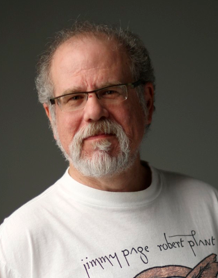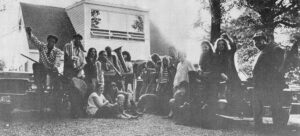
Bonnie Raitt’s lengthy career has been defined by her deft ability to occupy the liminal spaces of her life and art. Her vocals and slide guitar are forever unbound between prior iterations of herself and where she currently chooses to exist in music. She’s deftly lived in and around blues, folk, country, rock, and pop in various phases of her lengthy career. Whether it’s a Bonnie Raitt original or a song she has adopted and made her own, her ability to realize a lush soundscape out of words is extraordinary. It should come as no surprise, as a result, that her songs have been covered by some of the world’s best artists – from Boyz II Men to Adele – in the way that she has done in kind.
Listen to the best Bonnie Raitt songs on Apple Music and Spotify.
Raitt grew up in a musical household, but began to take music seriously in college in Cambridge, Massachusetts. Her plan when she arrived at school, as an African Studies major, was to travel to Tanzania, where President Julius Nyerere “was creating a government based on democracy and socialism. “I wanted to help undo the damage that Western colonialism had done to native cultures around the world,” she told Oprah.com.
While she was at school, however, she met the legendary blues promoter Dick Waterman. Before long, she took a leave of absence from school to go on tour with The Rolling Stones at the age of 20 – and the rest was history. A remarkable performer and incredible instrumentalist, it was her never-ending versatility that launched her career in the ’70s and ’80s before she achieved mainstream stardom in the ’90s and, eventually, a place in the Rock & Roll Hall of Fame.
Providing a template for the female musical interlocutors of the modern crossover era, Bonnie Raitt’s vast discography makes it difficult to distill to a list of her best songs. Nevertheless, below is a starting point of some of the more foundational tracks in her legendary journey. Lock in while Bonnie gives you something talk about.
The Early R&B Covers
(I Know, You’ve Been in Love Too Long, Let Me In)
The earliest phases of Bonnie Raitt’s career were punctuated by standout covers of R&B and Motown songs. Her second studio album, Give It Up, was highlighted by a reinterpretation of Barbara George’s 1961 R&B hit “I Know”, adding a rich new layer of instrumentation to the infectious melody with her band’s judicious use of conga, cowbell, and vibraphone in addition to her signature slide guitar to provide percussive and melodic depth to the cover. Raitt’s next album, Takin’ My Time, contains versions of Martha and The Vandellas’ “You’ve Been In Love Too Long” and Yvonne Baker’s “Let Me In.”
“Let Me In” sees Raitt applying a classic blues revival sound to the popular ditty, replete with rich brass performance. With “You’ve Been In Love Too Long,” she temporarily steps into the sound of a classic Motown ballad, managing the delicate dance of honoring the original sounds without sounding like a pastiche act. She would continue to do this throughout her career, injecting her unique vocal inflections and tonal reconfigurations onto the works of everyone from Bob Dylan to Aretha Franklin.
The Early Commercial Favorites
(Runaway, Don’t It Make You Wanna Dance, Too Long at The Fair)
As Bonnie Raitt built a name for herself touring with her blues and roots-inspired sound, she dropped albums that slowly expanded her palette and spoke directly to her activist predispositions (No Nukes: The Muse Concerts for a Non-Nuclear Future). The slow burn finally paid off with a minor hit on her sixth album, Sweet Forgiveness, when she applied her bluesy vocals to Del Shannon’s vintage hit “Runaway.”
Later, Raitt made an appearance on the soundtrack for the motion picture Urban Cowboy, with a booming pop-country gem in “Don’t It Make You Wanna Dance.” On “Too Long At The Fair,” Raitt offers a perfect melange of guitar and vocal arrangement, paired with beautifully melancholy couplets: “I never knew what laughin’ was/ ’Til you walked out the door/Won’t you come and take me home/I’ve been too long at the fair/And Lord, I just can’t stand it anymore.”
The Breakthrough Hits
(I’m in the Mood, Nick of Time, Thing Called Love)
Bonnie Raitt’s mainstream breakthrough came with her tenth album, Nick of Time. The record went multiplatinum and garnered her Grammy Awards for Album of The Year, Best Female Rock Vocal Performance, and Best Female Pop Vocal Performance. Her vocals – matured into an adult contemporary style – shine through on the title track. She drew from a pop-country sound, meanwhile, for her booming single “Thing Called Love.” Her fourth Grammy was courtesy of a collaboration with blues singer-songwriter John Lee Hooker – a duet remake of his sensuous best-selling record, “I’m in the Mood.” Husky and unvarnished, the refrain transports listeners into smoky rooms and illicit plans.
Bonnie Raitt, Country Superstar
(Not the Only One, I Can’t Make You Love Me, Love Sneakin’ Up On You, Something To Talk About)
It was Bonnie Raitt’s 11th album, Luck of the Draw, that made her a household name. The single “Something to Talk About” was an infectiously sly pop ballad anchored by Raitt’s trademark guitar stylings, adorned with brassy lyrics about the capricious nature of the rumor mill. “I Can’t Make You Love Me” followed suit, establishing her as a force in pop music heartbreak ballads. Between these two singles, Raitt transitioned from being the queen of covers to the one being covered. “I Can’t Make You Love Me” has been covered by artists from UK songstress Adele to R&B powerhouse Tank. “Not The Only One,” an amorous ballad reminiscent of long drives down country roads, is the perfect blend between adult contemporary pop and blues guitar. It’s a perfect reflection of how Raitt has evolved her sound through the years.
“Love Sneakin ‘ Up On You” highlights her capabilities as a songwriter, producer, vocalist, and guitarist. It details the tender nuances of yearning with turns of phrase such as “Fever turns to cold, cold sweat/Thinkin’ about things we ain’t done yet.” The lyrics are an apropos parallel to Raitt’s career – one anticipatory eye on the horizon while burning a consistent flame in the present. Through these twin efforts, Bonnie Raitt has persevered in the music business for decades, creating classics that sound contemporary and redefining the way we assess the boundaries of genres.
Think we’ve missed one of the best Bonnie Raitt songs? Let us know in the comments section below.














 Visitors Today : 74
Visitors Today : 74 Now Online : 1
Now Online : 1









































































































